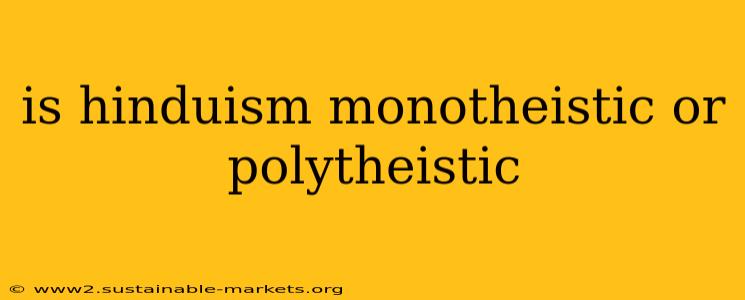The simple answer to whether Hinduism is monotheistic or polytheistic is: neither, or both, depending on your perspective. This seemingly paradoxical answer stems from the complex and multifaceted nature of Hindu beliefs and practices, which have evolved over millennia. Understanding this requires moving beyond simplistic labels and delving into the rich tapestry of Hindu theology.
The Polytheistic View: A Pantheon of Deities
At first glance, Hinduism appears polytheistic. A vast pantheon of gods and goddesses populate Hindu scriptures and mythology, each with their own unique attributes, domains, and stories. We encounter major deities like Brahma (the creator), Vishnu (the preserver), and Shiva (the destroyer), along with countless other gods and goddesses representing aspects of nature, human emotions, and cosmic forces. Temples are dedicated to these deities, and rituals are performed to invoke their blessings. This abundance of divine figures understandably leads many to classify Hinduism as polytheistic.
The Diverse Forms of Divinity: Avataras and Manifestations
Even within this seemingly polytheistic framework, the concept of Avataras (incarnations) of major deities complicates matters. Vishnu, for instance, is believed to have incarnated in various forms throughout history to restore dharma (cosmic order). These avatars, such as Rama and Krishna, are often worshipped as independent deities, blurring the lines between distinct gods and manifestations of a single supreme being.
The Monotheistic View: The Concept of Brahman
However, the core philosophy of Hinduism points towards a monotheistic, or perhaps more accurately, monistic, understanding. The ultimate reality in Hinduism is Brahman, an absolute, infinite, and impersonal divine principle. Brahman is the source and substance of all existence, the underlying unity behind the diversity of the phenomenal world. All gods and goddesses are considered manifestations or aspects of this ultimate reality, much like different facets of a single jewel.
The Path to Brahman: Different Yogas and Philosophies
Different schools of Hindu thought, such as Vedanta, emphasize the path to realizing the oneness of Brahman and the individual self (Atman). Through practices like meditation, yoga, and selfless service (karma yoga), individuals strive to transcend the illusion of separateness and attain liberation (moksha) – union with Brahman. This focus on ultimate unity suggests a monotheistic, or at least a strongly monistic, interpretation.
Beyond Simple Labels: A Spectrum of Belief
Ultimately, attempting to categorize Hinduism as strictly monotheistic or polytheistic is an oversimplification. The faith encompasses a wide spectrum of beliefs and practices, allowing for both polytheistic expressions of devotion and a profound understanding of the ultimate unity of all things in Brahman. It is this very inclusivity and flexibility that has allowed Hinduism to endure and adapt throughout history. The coexistence of seemingly contradictory elements is a fundamental characteristic of the faith, making a simple classification inadequate and potentially misleading.
Therefore, rather than focusing on rigid labels, it's more beneficial to understand the rich tapestry of Hindu thought, recognizing the multifaceted nature of its divinity and the diverse paths to spiritual realization it offers.

